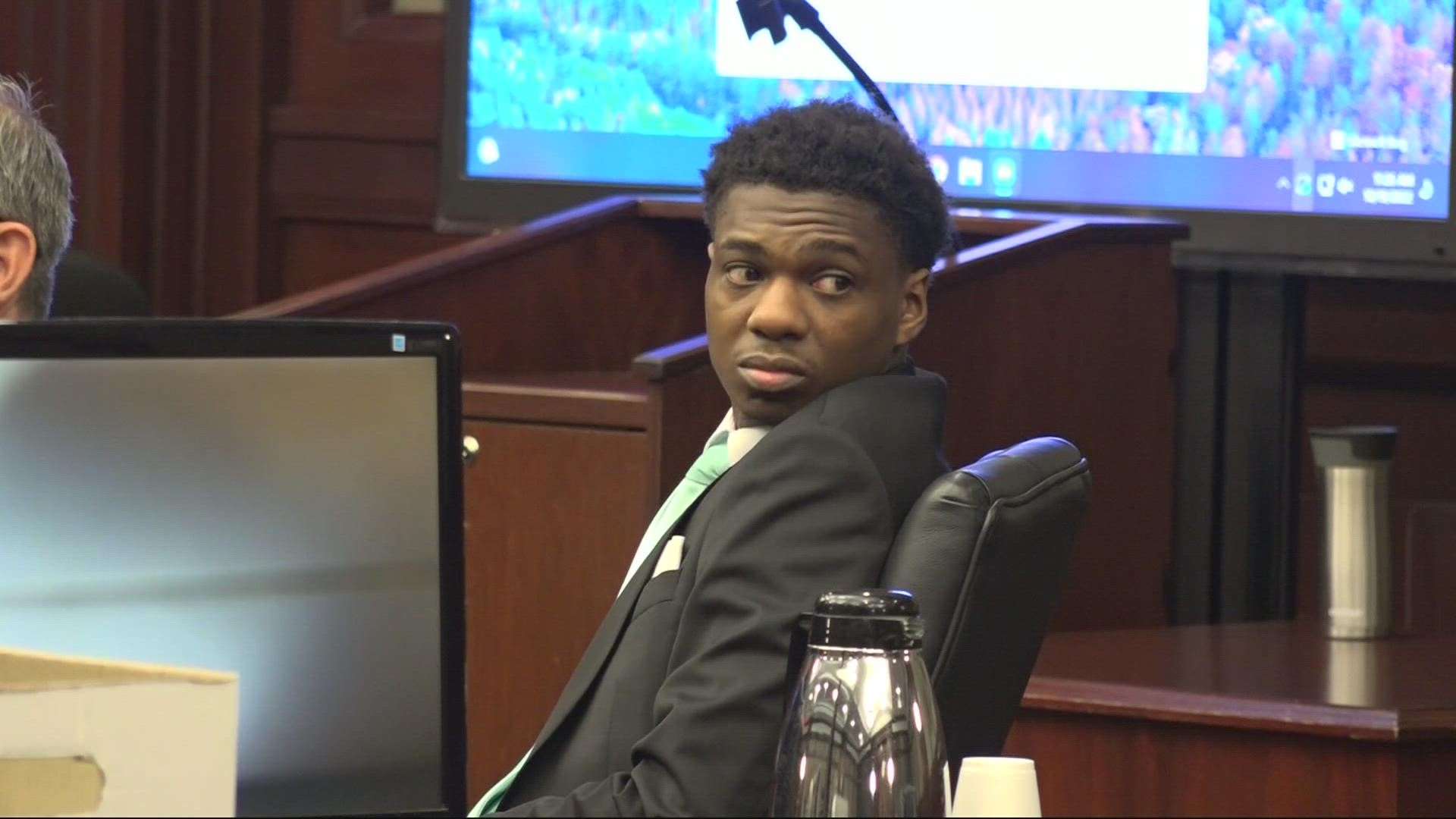JACKSONVILLE, Fla. — During the second day of the trial for Jacksonville rapper Noah Williams, the prosecution introduced his music for the first time, despite his attorneys' arguments.
Williams is charged with possessing a firearm as a convicted felon and police-certified gang member. He faces up to 15 years on that charge. If he is found guilty, the trial will enter a separate sentencing phase to decide if the charges will be enhanced due to Williams' alleged gang ties.
Williams, whose rap name is Spinabenz, is best known for his viral song 'Who I Smoke,' which references the names of several murder victims from Jacksonville. But this is a gun case, and the jury heard a different song, called 'My Glock.' Today prosecutors told jurors the lyrics mirror what they say happened in the alleged 2021 crime, including having his girlfriend buy him a Glock for $300 (the lyrics being: "I spent 300 on my Glock").
RELATED: Spinabenz trial day 1: Jury sees body camera footage of traffic stop, police officers take the stand
Williams’ attorneys fought to keep the song out of evidence, but it was allowed by Judge Jeb Branhem, who is overseeing the case, and the prosecution was able to play the song for the courtroom.
Detective Thompson with the Jacksonville Sheriff's Office said he heard the song several times while investigating Williams and has heard him rap "hundreds of times."
Williams' attorney, David Bigney, argued that the number 300 is simply a lyrical device in the song, and that the lyrics do not pertain to the case.
“300 for a drum? 300 762’s? So this 300 is more of a hook. That’s the hook of the song, the 300," Bigney said. "Cause it’s mentioned over and over again."
Thompson said he believed the song was relevant. "I mean, it mentions the Glock and other ammunition," he said.
"It mentions an airplane as well, and many things that have nothing to do with this case," Bigney countered.
The defense also questioned whether it could be proven that the song was written during a relevant timeframe, or that Williams wrote the song at all.
“Do you know when the lyrics for this song were written?” Brigney asked, to which Thompson said he guessed it was in 2021, because the song was posted to YouTube in November 2021.
"It's important that you don't guess," Bigney responded. He said it could have taken years to write, edit, produce and distribute the song, and the witness had no proof otherwise.
Thompson admitted that his only "experience" with the music industry was listening to music throughout his life.
The rest of the day focused on DNA evidence, with several DNA experts taking the stand.
Defense seeks acquittal
Late in the day Tuesday, Williams' attorneys asked Judge Branhem to acquit him, citing lack of evidence.
The prosecution's case hinges on the narrative that Williams had his girlfriend purchase a firearm for him. She was the registered owner of a Glock recovered during at traffic stop, where she was driving and Williams was in the passenger seat. The Glock was confiscated, and Williams' DNA was later found on the gun, which the prosecution argues proves it was his gun.
An officer with the Jacksonville Sheriff's Office, Officer Justin Peppers, testified that he noticed Williams' shirt pulled up at the traffic stop, and he believed that Williams had pulled the gun from his waistband. Assistant State Attorney Lauren Anderson says this is an integral part of the prosecution's argument.
The past two days in court have seen a litany of police officers and Jacksonville Sheriff's Office employees, as well as an expert witness from the Florida Department of Law Enforcement, which helped process the Glock for DNA evidence. Witnesses have testified that the vehicle and the Glock were not processed for fingerprints during the traffic stop. Witnesses also testified that 12% of the DNA on the Glock belonged to Williams, which his attorneys agree with. This technically makes him a "minor contributor," although it takes a significant amount of DNA to create that figure.
Following this testimony, Bigney petitioned the judge to grant a motion of acquittal in the case. He argued that no one has been able to specify at what point Williams' DNA got on the gun, meaning it could not be proven that he had taken the gun out of his waistband that night.
"No witness has seen my client with a firearm," Bigney said. During opening statements, he had promised the jurors that they would not hear from any witnesses who could testify they had seen Williams with the firearm, and so far, that has held true.
Judge Branhem denied the request. Court will resume Wednesday morning with closing arguments.

